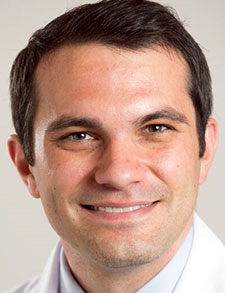Bolus IV 0.9% Saline Leads to Interstitial Permeability Pulmonary Edema in Healthy Volunteers
Clinical question: Can intravenous fluid (IVF) administration cause direct lung injury independent of cardiogenic overload?
Background: Bolus IVF therapy is a central component to managing critically ill patients with hypotension. In the clinical setting, pulmonary edema after IVF is thought to primarily occur by cardiogenic mechanisms, though studies in healthy subjects have suggested that IVF administration itself can lead to indirect lung injury and permeability pulmonary edema.
Study design: Randomized, crossover trial
Setting: Intensive care unit at a tertiary hospital in Australia
Synopsis: Fourteen healthy adult patients underwent two interventions: administration of a 30 ml/kg bolus of 0.9% saline over 20 minutes, or a sham intervention with no IVF administration. Participants had a two-week period between interventions. Before and soon after the administration of each intervention, participants underwent pulmonary function tests, lung ultrasounds, echocardiograms, and blood and urine sampling. Additionally, at 45 minutes after intervention, patients underwent bronchoscopy with bronchoalveolar lavage to assess for biomarkers consistent with lung injury.
Mean bronchoalveolar lavage total protein concentration was significantly higher after IVF administration compared to sham (196.1 mcg/mL versus 129.8 mcg/mL, P=0.0020). Additionally, plasma concentrations of another lung injury marker, angiopoietin 2, were significantly higher after IVF administration (1.531 ng/mL versus 2.263 ng/mL, P=0.001) and not with sham. Both findings occurred in the absence of any echocardiographic evidence of cardiogenic edema.
Bottom line: Intravenous fluids can cause pulmonary edema both by means of cardiogenic and direct lung injury and should be considered potentially implicated in patients who develop worsening respiratory status even in the absence of heart failure or circulatory overload.

Dr.Pizanis
Citation: Li H, Bersten A, et al. Bolus intravenous 0.9% saline leads to interstitial permeability pulmonary edema in healthy volunteers. Eur J Appl Physiol. 2021;121(12):3409-3419.
Dr. Pizanis is a hospitalist and associate professor of medicine at the University of New Mexico Hospital, Albuquerque, N.M.